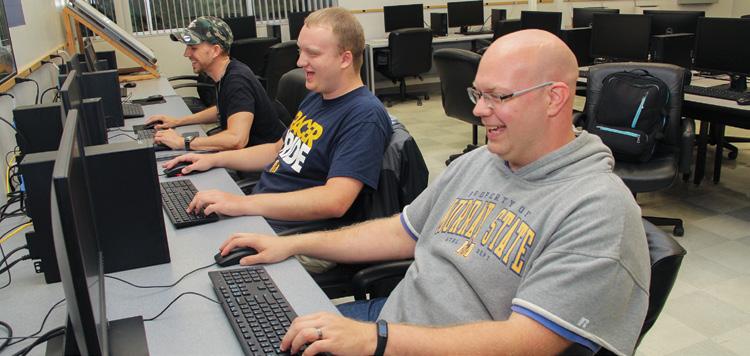
3 minute read
A Different Kind Of Game
A Different Kind Of Game
Esports creates educational opportunities
BY LISA SAVAGE
Sean Mitchuson and Brandon Dixon met when they were teenagers playing video games every Friday night at the home of a friend’s grandmother.
“Everybody would bring their game consoles, and we’d all play,” Mitchuson says. Before the days of online gaming, the local group met and enjoyed games like Quake and Doom. Now, some 20 years later, gaming still plays a significant role in the lives of Mitchuson and Dixon through their jobs at Murray State University.
Mitchuson, a senior systems administrator, and Dixon, an instructor in cybersecurity in the telecommunications systems management, have worked together to establish an esports program on the Murray State campus. Esports — short for electronic sports — brings competition through organized or multiplayer video gaming and now plays a significant role in the video game industry. “Esports has just exploded in the last few years,” Mitchuson says.
An esports club formed on campus about 10 years ago as a way for gamers to play, connect and compete, but Mitchuson, Dixon and several students worked to establish esports as a program in the telecommunications systems management department. Plans include designing and building a hybrid computer lab and arena to host gaming tournaments.
Esports uses tournaments and other organized competitions to help gamers connect, and it’s becoming a recruitment tool for colleges and universities. Some colleges with established programs offer full-tuition scholarships for gamers playing League of Legends and similar games in tournaments.
Students represent their schools in competition against other teams from all over the world. “Those are some of the best gamers in the world, and it’s a great recruitment tool to get them to play at those colleges and universities,” Mitchuson says. ”It’s engaging students in a way that traditional sports could never do.”
GAMING COMMUNITY
Esports caught the attention of Jacob Mitchell, a sophomore at Murray State University, because of the vibrant gaming community it represents. “I’ve always been interested in gaming,” he says.
The educational aspect of gaming helps him in his career path in engineering graphics and design. “It’s fun to have a group of people who share the same interest,” he says.
Mitchell likes to participate in Overwatch, a team-based game he plays often with others from places like Canada and California. “It’s just another way to find friends that have the same interests as you,” he says.
But it’s more than just having fun, he says. Esports focuses on team-based skills and helps develop players’ ability to strategize. “You’re training your brain to pay attention to details while getting a view of the big picture,” Mitchell says. “I don’t see esports decreasing in popularity.”

Esports director Sean Mitchuson, front, helps student player Jacob Mitchell, center, practice the game Overwatch, along with instructor Brandon Dixon.
MORE THAN ENTERTAINMENT
The popularity of gaming and esports led Mitchuson and Dixon to explore new possibilities with the Murray State program. The extensive educational opportunities provide options for students that are fun and interesting. “It’s like a hybrid educational and entertainment program,” Dixon says. The esports club’s membership shrank over the past few years, but when the instructors reached out to gauge interest in a curriculum-based program, participation jumped to about 60 students in the first few hours.
The number of game designers and those interested in working in the gaming industry grows each year, but many of the benefits go beyond gaming. Dixon’s interest in gaming led to his career in computers and technology, and today’s students have even more opportunities. “These students are learning academically while they’re doing something they love,” he says.
The mechanics of gaming help with many career choices, such as statistics, math and even history. “I have a history degree, and I had no idea what to do with it,” Mitchuson says. But a history background would be ideal to help create an esports archive, he says.
Murray State offered summer camps in gaming and esports, and students helped plan and schedule events, including managing the budget. “We’re hoping to use esports and academics in many different ways,” Dixon says. “The principles can apply to many other areas.”
ELIMINATING THE STIGMA
There’s still some stigma with gaming, but esports helps change those perceptions, Dixon says. “There used to be a stigma that only nerds were gamers. That’s just not the case, now,” he says. “Once the technology developed and everybody started getting a better internet connection, more people started to play.”
The creation of Call of Duty, a firstperson shooter video game with the first edition set in World War II, and Madden, based on the National Football League, introduced different groups to gaming. It wasn’t just games based around fantasy, science fiction and futuristic worlds. “Once these games came out, it was no longer perceived as a cliquish group of nerdy kids playing games,” Dixon says. Now, esports provides career opportunities students never thought about. “This is something that would never have been possible without the internet technology that allows for this kind of interactive play,” he says. “It’s no longer just available for people in big cities. The culture spans from the cities to rural areas and everywhere in between.”




